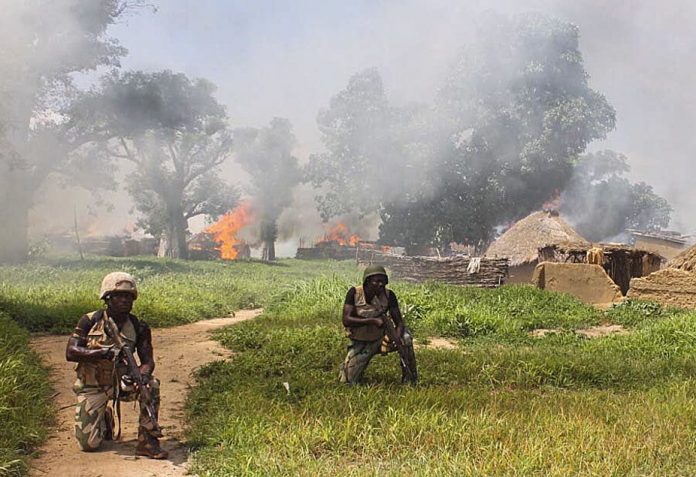The president of Ethiopia’s Tigray region says his forces fired rockets at Eritrea’s airport on Saturday night, widening the conflict in the area.
Debretsion Gebremichael accused the Ethiopian national forces of using the airport to launch attacks on Tigray.
Ethiopia’s federal government has not yet commented on the accusation.
But the attack is seen as a major escalation of the 12-day conflict between the Ethiopian government and the governing party in Tigray.
Fighting over Tigray has also affected Sudan, with at least 17,000 civilians crossing the border from Ethiopia, according to the UN.
How Ethiopia’s conflict could destabilise its neighbours
Marooned by conflict: ‘My little brother needs medicine’
Ethiopia has been through big changes since its Prime Minister Abiy Ahmed came to power in 2018. He was awarded the Nobel peace prize last year after reaching out to make peace with neighbouring Eritrea, with whom Ethiopia had fought a bloody war two decades ago.
But the widespread reforms he pushed through sidelined the Tigrayans of the TPLF who had long dominated the political scene – and in recent weeks, tensions between the The Tigray People’s Liberation Front (TPLF) and the federal government seriously escalated.
What happened in Eritrea?
On Saturday night, residents of Asmara reported hearing loud explosions, amid reports of rockets landing near the city’s airport. No casualties have been reported yet.
The Tigrayans have also accused Eritrean forces of crossing into Ethiopia to back federal forces there.
Reuters news agency quotes the Tigrayan leader Mr Debretsion as saying that his forces have been fighting 16 divisions of the Eritrean army on several fronts for the past few days.
While Eritrea’s government has denied any role in the conflict, the BBC’s Africa regional editor Will Ross says reports of fighting along the border, and of soldiers being treated in Eritrean hospitals, suggest the opposite is true.
With missiles being fired into Eritrea this conflict has now become far more serious and is likely to be harder to stop. The repercussions could now cause instability in the whole region.
But many people familiar with recent political developments had predicted trouble was brewing when Ethiopia’s Prime Minister Abiy Ahmed became a strong ally of Eritrea’s authoritarian leader, Isaias Afwerki.
Now the two men have a common enemy – the Tigrayan politicians of the TPLF who dominated Ethiopia’s political scene for years, including the time when Ethiopia and Eritrea fought a border war that left tens of thousands dead.
International calls for dialogue have so far been ignored and thousands of civilian refugees continue to flee the fighting into Sudan.
What do we know about other airport attacks?
The TPLF say they are behind rocket attacks on two airports in Ethiopia’s Amhara region, south of Tigray.
One rocket hit the airport in Gondar and partially damaged it, while a second fired simultaneously landed just outside of the airport in Bahir Dar, an Ethiopian government official said.
The Tigrayans said the rocket attacks were retaliation for recent air strikes conducted by Mr Abiy’s forces.
How bad is the violence?
Hundreds have died in Ethiopia since the fighting began, with reports of a civilian massacre emerging this week.
Human rights group Amnesty International said it had confirmed that “scores, and likely hundreds, of people were stabbed or hacked to death” in the town of Mai-Kadra (May Cadera) on Monday.
Why there are fears of civil war in Ethiopia
Fake news being shared over Ethiopia conflict
Prime Minister Abiy Ahmed has accused forces loyal to Tigray’s leaders of carrying out the mass killings, while the TPLF has denied involvement. Ethiopia’s human rights commission said it would send a team to investigate.
media captionFour things that explain the crisis in the Tigray region of Ethiopia.
Communication is difficult at the moment because internet and mobile phone services have been cut.
There are already reports of a shortage of flour and fuel – and, worst of all, water, which was already rationed.
In Mekelle, which has a population of between 400,000 and 500,000, homes used to get piped water once a week, but the supply has stopped.
Families used to buy water from vendors but with phones disconnected they can no longer call to put in orders.
On Thursday it was reported that a power-generating dam had been damaged in an air strike, cutting electricity supply in the region.
I am anxious about the safety of my family, especially my 11-year-old brother who is suffering from cerebral palsy and epilepsy.
I am extremely worried about whether he will get his medication.
As he cannot talk, I used to see him during video calls but that is now not possible.
Read more about life in Tigray
Why are the government and TPLF fighting?
The TPLF dominated Ethiopia’s military and political life for decades before Mr Abiy took office in 2018 and pushed through major reforms.
Last year, Mr Abiy dissolved the ruling coalition, made up of several ethnically based regional parties, and merged them into a single, national party, which the TPLF refused to join.
The feud escalated in September, when Tigray held a regional election, defying a nationwide ban on all polls imposed because of the coronavirus pandemic. Mr Abiy responded by calling the vote illegal.
Tigray’s administration sees Mr Abiy’s reforms as an attempt to hand his central government more power and weaken regional states.
It also resents what it calls the prime minister’s “unprincipled” friendship with Eritrean President Isaias Afwerki.
Mr Abiy won the Nobel Peace Prize in 2019 for his efforts to bring peace with Eritrea.
The prime minister believes TPLF officials are undermining his authority.
Mr Abiy ordered the military operation against the TPLF after he said its fighters had crossed “the last red line”. He accused them of attacking a military camp hosting federal troops on 4 November, calling the action “treasonous”. The TPLF has denied attacking the camp.
Source: BBC





